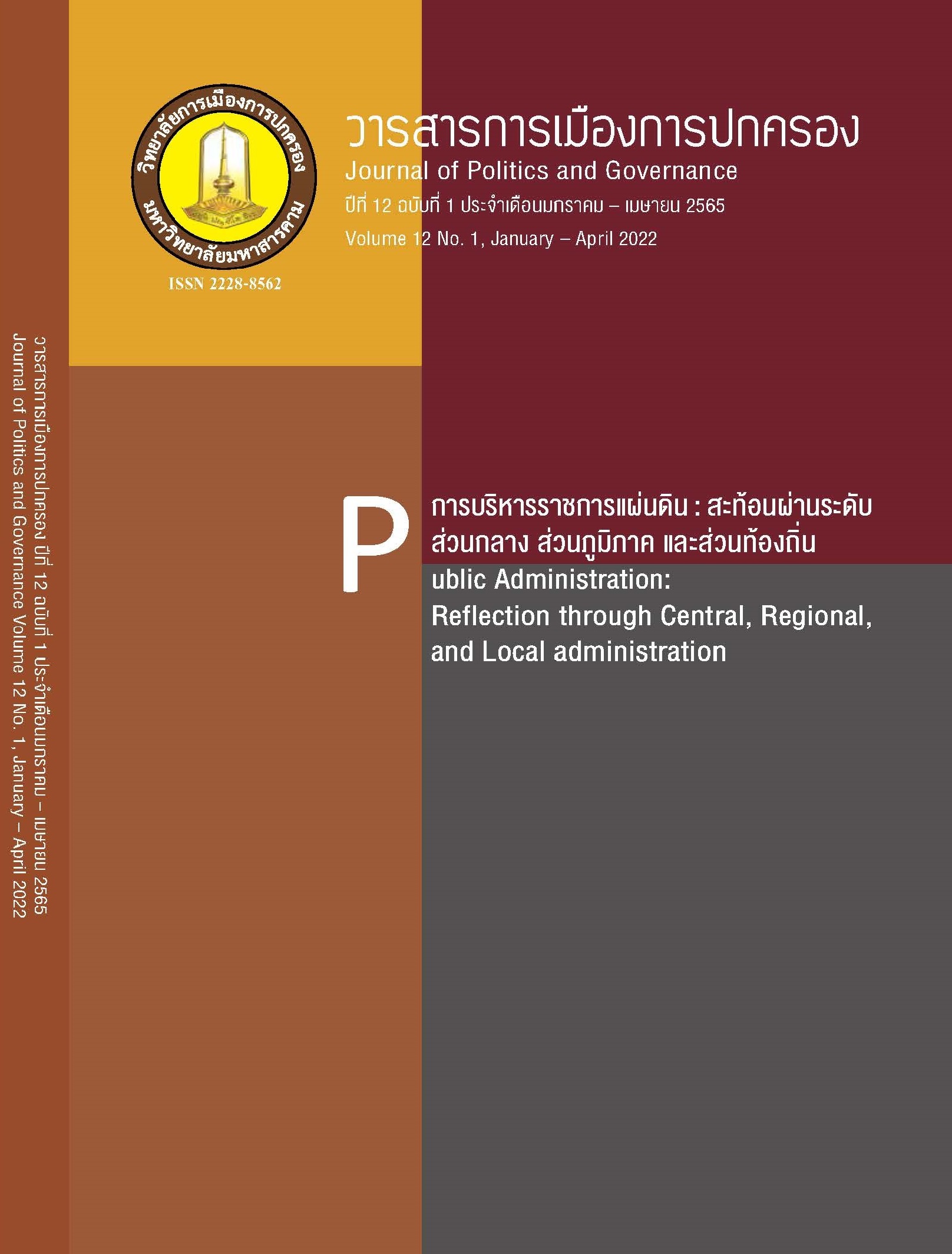The Establishment of Participatory Process and Mechanisms in the Making of Community Plans to Promote Local Goods Case study of Kut Wa, Kuchinarai District, Kalasin Thailand
Main Article Content
Abstract
The establishment of participatory process and mechanisms in the making of community plans is a study aiming to develop participatory mechanisms in community plans and to investigate participatory factors among various participants and stakeholders relevant to the making of community plans. A qualitative research compiling with an application of Participation Action Research (PAR) approach emphasizing on participation and action practices toward selected sample of 46 individuals retrieved from purposive and snowball sampling methods was manipulated thoroughly in this study. Research results revealed that the leaders of community were found as the main participation-driven ones in community enabling such influential roles as being able to.,(1) Create and provide knowledge to the other group leaders as well as the people in the area. (2) Collect and analyze data together with the people in community. and (3) Proceed with the plans and conduct participatory activities while realizing an evaluation of an outcome was still neglected .Henceforth, there were derivative suggestions drawn from the mutual enhancement of collaborative learning and understanding in the community planning process. 1. The making of a community plan should be changed from occupying community-based planning to be participatory-based planning so that the people can participate more in the process: providing and sharing needs on any circumstances of the community. 2. Local government organizations provide more opportunity and integration for the local in a stage of community planning process. 3. A One-size-fit-all approach is no longer applicable to participatory development in which aimed to emphasize raising quality of participation in local community. 4.There should be no timeframe - based practice in community planning process. 5. In data analysis, separating needs from problems should be manipulated to increase participation mechanisms among the local people as it can be genuinely practicable.
Article Details
References
กรมการพัฒนาชุมชน. (2550). การขับเคลื่อนกระบวนการแผนชุมชน. สำนักเสริมสร้างความเข้มแข็งชุมชน. กรมการพัฒนาชุมชน.
เทศบาลตำบลกุดหว้า. (2561). แผนพัฒนาสี่ปี (พ.ศ.2561-2564). กลุ่มงานสำนักปลัด. เทศบาลตำบลกุดหว้า.
เทศบาลตำบลกุดหว้า. (2561). แผนพัฒนาสามปีองค์การบริหารส่วนตำบลกุดหว้า. กลุ่มงานสำนักปลัด. เทศบาลตำบลกุดหว้า.
ชาย โพธิสิตา. (2547). ศาสตร์และศิลป์แห่งการวิจัยเชิงคุณภาพ. นครปฐม : สถาบันวิจัยประชากรและสังคม, มหาวิทยาลัยมหิดล.
นครินทร์ เมฆไตรรัตน์. (2554). ทิศทางการปกครองท้องถิ่นของไทยและต่างประเทศเปรียบเทียบ. กรุงเทพฯ: วิญญูชน.
วสันต์ เหลืองประภัสร์ และคณะ. (2557). โครงการการสังเคราะห์ตัวแบบเชิงทฤษฎีและการบริหารจากผลการ ดำเนินโครงการวิจัยเพื่อพัฒนากลไกความร่วมมือเพื่อแก้ปัญหาร่วมกันของคนในพื้นที่. โครงการวิจัยเสนอต่อสำนักงานกองทุนสนับสนุนการวิจัย.
วรรณดี สุทธินรากร. (2560). การวิจัยเชิงปฏิบัติการแบบมีส่วนร่วมและกระบวนการทางสำนึก. (พิมพ์ครั้งที่ 2). กรุงเทพมหานคร: สำนักพิมพ์สยาม.
วุฒิสาร ตันไชย. (2547). การกระจายอำนาจและการปกครองท้องถิ่น: ความก้าวหน้าหลังรัฐธรรมนูญ พ.ศ. 2540. กรุงเทพฯ: คลังวิชา.
สุภางค์ จันทวานิช. (2540). วิธีการวิจัยเชิงคุณภาพ (พิมพ์ครั้งที่ 16). สำนักพิมพ์แห่งจุฬาลงกรณ์มหาวิทยาลัย.
สุภางค์ จันทวานิช. (2540). การวิเคราะห์ข้อมลในการวิจัยเชิงคุณภาพ. กรุงเทพมหานคร : สำนักพิมพ์แห่งจุฬาลงกรณ์มหาวิทยาลัย.
Ansell, C., & Gash, A. (2008). Collaborative governance in theory and practice. Journal of Public Administration Research and Theory, 18(4), 543–571.
Agranoff, R, & McGuire, M. (2003). Collaborative public management: New strategies for Local Governments. Washington, DC: Georgetown University Press.
Asnarulkhadi A.S & Fariborz Aref. (2010). The theoretical and conceptual framework and application of community empowerment and participation in processes of community development in Malaysia. Journal of American Science, 7(2).
Chee, S. (1975). Government Policy and Rural Development in Malaysia, in proceeding of a seminar on approaches of rural development in Asia. Kuala Lumpur: Asian Centre for Development Administration.
Cohen, J.M. & Norman T, Uphoff. (1977). Rural development participation: Concepts and measures for project design, implementation and evaluation. Cornell University.
Emerson, K., & Nabatchi, T., & Balogh,S. (2011). An integrative framework for collaborative governance. Journal of Public Administration Research and Theory, 22 (1), 1–29.
Emerson, K., & Nabatchi, T. (2015). Collaborative Governance Regimes. Washington, DC: Georgetown University Press.
Faulkner, D.O. & De. Rond, M. (2000). Perspective on Co-operative Stratrgy. In Faulkner, D.O. and De. Rond, M (Eds). Co-operative Stratrgy: Economic, Business and Orgaisational Issues. Oxford University Press. 3-39.
Gajda, R. (2004). Utilizing Collaboration Theory to Evaluate Strategic Alliances. American Journal of Evaluation, 25(1), 65-77.
Gray, B. (1989). Collaborating: finding common ground for multiparty problems. San Francisco, CA: Jossey-Bass.
Huxham, C. (2000). The Challenge of Collaborative Governance. Public Management Review, 2(3), 337–358.
Siedentopf, H. (1987). Decentralization for rural development. Government approaches.
And people’s initiatives in Asia and the Pacific. In A. Bhatt, L. V. Carino, K. Shams, & G. Sosmena (Eds.), Building from below local initiatives for decentralized development in Asia and Pacific (Vol. 1). Kuala Lumpur: Asian and Pacific Development Center.
Sullivan, H. & Skelcher, C. (2002). Working across Boundaries: Collaboration in Public Services. Basingstoke. Palgrave Macmillan.
Williams, P. & Sullivan, H. (2007). Working in Collaboration: Learning form Theory & Practice. Cardiff: National Leadership and Innovation Agency for Healthcare.


